Table of Contents
Iodine is an essential trace element that combines with the amino acid tyrosine to form thyroid hormones T4 and T3. Thyroxine (T4) contains four iodine atoms, and triiodothyronine (T3) contains three iodine atoms.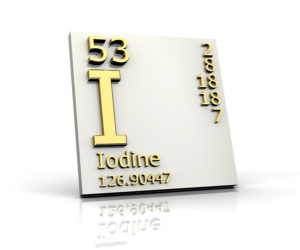
Iodine deficiency is recognized as the most common cause of preventable brain damage in the world. Even moderate deficiency results in a loss of at least 10 – 15 IQ points.[i] And the reason we’ve added iodine to our list of essential nootropics.
Insufficient iodine is not only a problem in developing countries. Studies have found even in Western countries; iodine deficiency has become a critical health problem.[ii]
Your thyroid gland absorbs iodine from your blood supply to make and release thyroid hormones. Your thyroid affects every cell in your body and brain through the hormones T4 and T3.
Within your brain, T4 is converted to T3 by selenium which then affects gene expression controlling metabolism within cells. And activates the catecholamines dopamine, norepinephrine and epinephrine.
Malfunctioning thyroid function which is often caused by insufficient iodine results in poor cognition, difficulty learning, problems with recall, depression and anxiety.
Iodine helps:
- Neurotransmitters: Iodine is required for the production of thyroid hormones T4 and T3. Thyroid hormone receptors in the brain help regulate the production and use of all important neurotransmitters.
- Brain Energy: Iodine is necessary for the production of thyroid hormones which help control cellular metabolism and energy use within brain cells. Supplemental Iodine usually results in increased energy levels and feelings of well-being.
- Neuroprotectant: Iodine can kill bacteria, fungal infections, and viruses. Iodine will remove fluoride, chlorine and bromine.[iii] And helps your body detox heavy metals like mercury and cadmium that other detox methods can’t remove.
What is Iodine?
Iodine is an essential trace element needed for the creation of thyroid hormones in your body. Iodine combines with the amino acid tyrosine to produce thyroxine (T4) and triiodothyronine (T3).
The most abundant source of Iodine in our diet comes from seafood like kelp, saltwater fish, seal meat, whale meat, oysters, mussels and lobster.
Iodine is also found in beans, milk and milk products, eggs, spinach and vegetables grown in or produced from soil rich in iodine. Typically found near coastal areas of the world.
The most seriously iodine-deficient parts of the world are mountainous and inland areas. Including much of the agricultural producing areas of Western countries like Australia, Canada, USA and Europe.
Iodine is absorbed by your thyroid gland for the production of thyroid hormones. The pituitary gland in your brain releases thyroid stimulating hormone (TSH) instructing your thyroid to release T4 and T3.
T4 and T3 are produced by combining tyrosine (thyroglobulin) with iodine and released into your blood stream. Thyroid transport proteins then carry the hormones to target cells all over your body including your brain.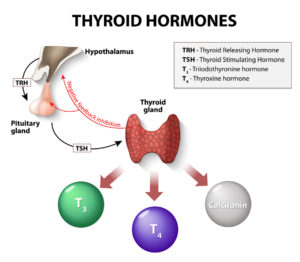
Nearly all of your body’s functions in nearly every tissue rely on thyroid hormones. Their actions and influence are so wide ranging that you cannot live without them.
Thyroid hormones affect brain development, heart rate, lung function, blood function, bone growth, steroid hormone production, including the breakdown of sugar, fat and protein. And even some immune processes.
Iodine is even involved in how the other nootropics in your stack are utilized by cells in your brain. The bottom-line is Iodine could be one of the most important additions to any nootropic stack.
How does Iodine work in the Brain?
Iodine boosts brain health and function in several ways. But two in particular stand out.
- Iodine is critical for neurotransmitters. Iodine is required for the production of thyroid hormones T4 and T3. Thyroid hormone receptors in the brain help regulate the production and use of all important neurotransmitters.
Not enough iodine results in too little T3 and T4 in your body. Symptoms of inadequate thyroid hormones (hypothyroidism) include insomnia, fatigue, difficulty concentrating, depression, dry skin and hair, cold sensitivity, frequent and heavy periods for woman, and joint and muscle pain.
- Iodine is required for a healthy immune system. Iodine is antibacterial, antiparasitic, antiviral and has anticancer properties.
Your thyroid is the main storage site for iodine. But this mineral is also concentrated in your glandular system including your salivary and sweat glands. Ovaries, breasts, pancreas, cerebral spinal fluid, skin, stomach, prostate and your brain all contain high concentrations of iodine.
Iodine is a powerful method for removing heavy metals and halides like fluoride, chlorine and bromine from your system. These chemicals compete for the same thyroid receptors in cells used by thyroid hormones. So removing these toxins will help thyroid hormones do their job of gene expression and metabolism.
How things go bad
Iodine is needed by the thyroid to produce the thyroid hormones T4 and T3. Part of the endocrine system, the thyroid secretes hormones that enter your circulatory system. And are transported throughout your body. Every cell has receptor sites for thyroid hormones.
Neurotransmitters are used by neurons to communicate with one another. The presynaptic neuron releases a neurotransmitter which then binds to a receptor on the postsynaptic cell.
Here we’re going to explore how neurotransmitters relate to the endocrine system and thyroid health. And what can go wrong.
Thyroid hormones are involved in the gene expression needed for neurotransmitter release.[iv] Low levels of iodine result in low levels of thyroid hormones which result in low neurotransmitter levels.
Iodine and Serotonin
Several studies have shown that low T3 results in reduced levels of serotonin in the brain. If you don’t respond to SSRI’s for depression it could be due to a thyroid hormone imbalance.[v] The result is depression.
Iodine and GABA
In animals and humans there is a direct link between thyroid levels and GABA. Thyroid hormones affect enzymes responsible for synthesis and degradation of GABA, levels of glutamate and GABA, GABA release and reuptake, and GABA(A) receptor expression and function.[vi]
GABA is your brain’s natural Valium. GABA can help turn off stress after you get upset. Or even prevent a stress response in the first place. Low iodine results in low levels of thyroid hormones affecting GABA. Which can lead to depression or anxiety.
Iodine and Dopamine
Thyroid hormones play a role in dopamine release in the brain.[vii] One study showed that an imbalance between thyroid hormones and dopamine could be responsible for restless leg syndrome.[viii]
Iodine and Acetylcholine
Thyrotrophic-releasing hormone (TRH) increases acetylcholine (ACh) synthesis.[ix] One study showed that those with hypothyroidism had significantly decreased acetylcholine in the hippocampus. And that administration of T4 normalized ACh levels.[x]
Insufficient iodine can result in hypothyroidism. And negatively affect ACh synthesis in the brain. Affecting cognition, memory, learning, recall and mood.
Not enough iodine in your diet negatively affects neurotransmitters in your brain. And can result in depression, brain fog, anxiety, learning and memory problems, and ultimately lead to neurodegenerative diseases like Alzheimer’s and Parkinson’s.
Iodine benefits
Most neurohackers associate Iodine with the thyroid because Iodine is needed to produce thyroid hormones T4 and T3. But Iodine is also concentrated in your salivary glands, stomach, breasts, ovaries, eyes and in your brain.
Deficiency in Iodine in any tissue will cause problems in that area of your body. And weaken your immune system. Symptoms of low Iodine show up as brain fog, skin problems, fibroids, fibromyalgia, and chronic fatigue.
Iodine can kill bacteria, fungal infections, and viruses. Iodine will remove fluoride, chlorine and bromine.[xi] And helps your body detox heavy metals like mercury and cadmium that other detox methods can’t remove.
Iodine helps prevent and even reverse breast cancer. And helps prevent mental retardation in young children.
Your brain needs sufficient Iodine for cognition through several mechanisms of action. This essential element is involved in gene expression that controls the synthesis of neurotransmitters in your brain. And how they work.
Iodine helps remove fluoride throughout your body including your brain. Studies show that fluoride can damage your brain, reduce intelligence, and impair memory. Fluoride has even been associated with dementia according to a study by The National Academies of Science, Engineering and Medicine.[xii]
One recent study showed that water fluoridation in England is linked to higher rates of underactive thyroid.[xiii] One of the simplest things you can do to boost cognition and your thyroid is to stop using fluoridated water and toothpaste. And start supplementing with Iodine to remove the fluoride toxicity and boost thyroid health.
Iodine Deficiency Disorders are considered one of the biggest worldwide public health problems today. Studies around the world show none of us are immune from Iodine deficiency. Estimates range from 10 – 90% of the world population don’t get sufficient Iodine depending on where you live.[xiv]
Adding Iodine to your stack if you are deficient is one of the easiest and least expensive ways to prevent and even cure a host of health problems. Including boosting cognition and memory.
How does Iodine feel?
Many neurohackers report an increased level of focus, energy, memory, and cognitive ability when supplementing with Iodine.
You should also experience improved quality of sleep. And have an overall improvement in mood.
Others report a profound difference in energy levels, they are more alert, and fatigue in the afternoon disappears. A few even report a significant improvement in tinnitus.
Iodine Clinical Research
One of most common reasons we use nootropics is to boost memory and mental energy. Memory loss drastically reduces quality of life. And simple brain fog makes it difficult to accomplish the simplest of tasks.
Research has shown that Iodine is involved in memory, learning and cognition on several levels. And supplementing with Iodine is one of the most fundamental things you can do to boost cognition.
Iodine raises the world’s IQ
The world’s greatest concentration of iodine deficient countries in the 1990’s was the former Soviet republics of Central Asia. Worldwide, about 2 billion people or a 3rd of the world population get too little iodine.
Studies show that iodine deficiency is the leading preventable cause of mental disorders. Even moderate deficiency lowers intelligence by 10 – 15 IQ points.
The most visible and severe effects manifest as goiters, dwarfism and cretinism. Ever hear someone use the derogatory term “cretin” to describe someone with low intelligence?
Cretin describes a child born and raised with severe mental disabilities, small stature and weakness all due to not enough Iodine in the mother’s diet when she was pregnant.
 In Japan, people get Iodine from seafood, seaweed, vegetables grown in Iodine-rich soil or animals that eat grass grown in that soil. But even in wealthy nations like the USA and the UK, people still need to supplement. Usually by using iodized salt. Or adding it to their stack as a supplement.
In Japan, people get Iodine from seafood, seaweed, vegetables grown in Iodine-rich soil or animals that eat grass grown in that soil. But even in wealthy nations like the USA and the UK, people still need to supplement. Usually by using iodized salt. Or adding it to their stack as a supplement.
According to Dr. Gerald Burrow, a former dean of Yale’s medical school, “For 5 cents per person per year, you can make the whole population smarter than before”. Simply by adding iodine to the salt supply.
Back in the old Soviet republic, Kazakh children were stunted compared to same-age Russian children. A survey of 5,000 households in 1996 found that 10 percent of children were stunted. And iodine deficiency identified as the main culprit.
In Kazakhstan, Turkmenistan, Tajikistan, Uzbekistan, and Kyrgyzstan campaigns were run promoting iodized salt. Salt companies were persuaded to add iodine to salt before putting it in stores.
In Kazakhstan in 1999, only 29% of households were using iodized salt. Now, 94% of households are. And in 2007, the United Nations certified the country officially free of iodine deficiency disorders.
In raising the world’s IQ, the secret’s in the salt.[xv]
Iodine deficiency and ADHD
A 10-year study conducted in Italy investigated the children born to 16 women from an iodine-deficient area (Area A) and 11 control women in an iodine-sufficient area (Area B).
ADHD was diagnosed in 11 of the 16 children born in Area A but none in Area B. Total IQ score was nearly 20-points lower in Area A children compared to Area B.
The researchers noted that the prevalence of ADHD in children born in Area A could only be compared to similar children with a resistance to thyroid hormones.
And that iodine-deficiency was the likely cause of ADHD due to a critical reduction in intracellular thyroid hormone T3 available to the developing brain.[xvi]
Iodine Recommended Dosage
Recommended Iodine dosage is very difficult because everyone needs different amounts based on your body’s ability to use the Iodine. And the level of exposure you have to daily toxins like fluoride, chlorine, and other halides.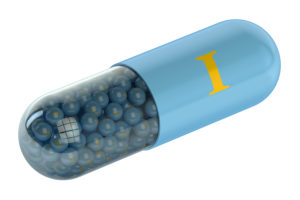
If you are dealing with a severe health problem, then your dosages would need to be higher that someone trying to maintain good health.
Maintenance and for optimal cognition – Natural health doctors have been recommending up to 50 mg of Iodine per day. But I’ve since revised my recommendations based on the latest research and potential health problems caused by iodine toxicity.
The maximum adult dosage for adult is 1 mg Iodine per day. Recommended maintenance dosage is the same.
Cancer – Cancer is a result of mutated cells. Iodine is critical for the P53 gene which prevents damaged cells from dividing.[xvii] Iodine and selenium helps P53 do its job of eliminating abnormal cells. Cancer patients have used 50 – 300 mg of Iodine per day successfully.
Supporting supplements to take with Iodine include:
- Selenium – 200 mcg per day. Selenium is required for the production of T3. And assists in detox.
- Vitamin C – 2,000 – 5,000 mg per day helps support thyroid symporters which transport thyroid hormones through the body including across the blood-brain barrier. And assists in detox.
- Magnesium – 400 mg per day. See my post on Magnesium as a nootropic.
Iodine should be taken with food particularly if you have a sensitive stomach. The supporting supplements can be taken at the same time as your Iodine dose.
Iodine should be taken early in the day because it can increase energy levels so much you could have problems sleeping.
Iodine Side Effects
Most forms of Iodine can cause diarrhea and bloating. Particularly at higher doses. Those with a sensitive stomach could experience stomach pain and is the reason we suggest taking Iodine with food.
It is also possible to overdose on Iodine. So please start at a lower dose and see how your body reacts. Symptoms of Iodine overdose include abdominal pain, delirium, fever, vomiting and shortness of breath.
Iodine is a powerful method for removing toxins and heavy metals from your body which can also produce unpleasant effects. If you experience flu-like symptoms when starting Iodine its very likely you’re feeling the effects of toxins being flushed out of your cells and your body.
For more on Iodine toxicity, here’s information from Nature Reviews Endocrinology.
Types of Iodine to Buy
Iodine is sold in many forms but the main thing to look for; does the product contain both Iodine and Iodide. Your body needs both forms. Breasts look for Iodine and the thyroid needs Iodide. Contrary to some sources; your body cannot convert supplemental Iodine to Iodide.
Also important is to understand and recognize the difference between milligram (Mg) doses vs. microgram (Mcg) amounts. Mcg doses is how most mainstream as well as integrative health practitioners recommend Iodine dosage .
Recommended forms
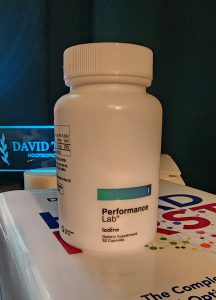 I highly recommend Click for Performance Lab® Iodine which is pure and produced using NutriGenesis® technology which is a highly bioavailable form of Iodine.
I highly recommend Click for Performance Lab® Iodine which is pure and produced using NutriGenesis® technology which is a highly bioavailable form of Iodine.
Other options include:
- Lugol’s liquid – Iodine/Potassium Iodide – 2% and 5% solutions. 2% solution is 2.5 mg/drop and 5% solution is 6.25 mg/drop
- Iodoral – Lugol’s formula in pill form – Iodine/Potassium Iodide – 12.5 mg and 50 mg
- Biotics Research Iodizyme – 12.5 mg per tablet of Iodine/Iodide
- Tri-Iodine by Vitaminlife – 12.5 mg per tablet of Iodine/Iodide
Other forms not recommended
- “Nascent Iodine” which is iodine in its atomic state and is a very low dose. Not enough to detox heavy metals, fluoride, bromine and chloride. Or to saturate tissues.
- Iosol which is Iodine only, and the micro doses have the same issues as Nascent Iodine
- Prolamine which has 3 mg of Iodine and 20 mg of Calcium may be too low to detox the body and saturate tissues
- Pure Encapsulations, Solaray, Source Naturals, Progressive Labs and NOW all offer mcg doses of Iodide only
- Kelp because of low Iodine status, not being able to determine levels of Iodine and possibly toxic due to arsenic and halides
Nootropics Expert Recommendation
Iodine up to 1 mg per day
 I recommend using Iodine as a nootropic supplement.
I recommend using Iodine as a nootropic supplement.
Your body does not make Iodine on its own. So to get its benefits it needs to come from your diet. Or you must take it as a supplement.
Iodine is especially helpful for those dealing with brain fog, poor cognition and memory, low energy levels and a sluggish thyroid.
Iodine is also particularly useful to help rid your body of the daily toxins we’re exposed to every day including heavy metals, fluoride, chloride, bromine and other halides.
While most forms of Iodine are helpful for overall health, keep in mind it’s the thyroid hormones T4 and T3 which influence cognitive health.
Thyroid hormones are produced from tyrosine and Iodine. And the production of T3 from T4 requires selenium which should be a part of your stack when using Iodine.
I recommend an Iodine supplement which contains both Iodine and Potassium Iodide to boost cognition.
Iodine is a fast-acting nootropic that can also help prevent brain degeneration later in life.
I highly recommend Click for Performance Lab® Iodine which is pure and produced using NutriGenesis® technology which is a highly bioavailable form of Iodine.

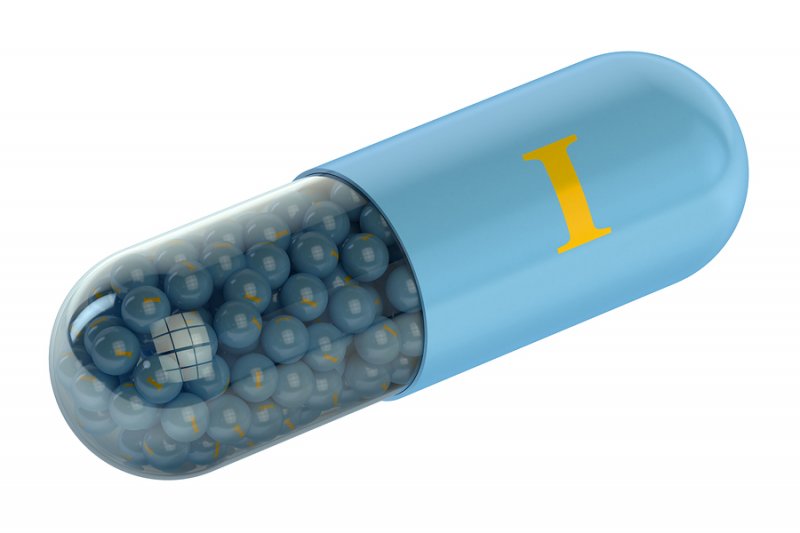







Join The Discussion - 271 comments
Dave
February 15, 2021
Hello, why do you recommend Iodoral, which is at a minimum 12.5mg, when the recommended dosage of Iodine/Iodide is so much lower? Are you supposed to split the tablets or take them once a week, or only for a limited time?
I’ve been visiting this site long enough to remember (I think) when the recommended dosage was so much higher – is the Iodoral recommendation simply a leftover from those times?
David Tomen
February 15, 2021
Dave, for the longest time I had the recommended dosage for Iodine at around 50 mg per day. But the more I researched this subject I came to realize that that was the opinion of a handful of natural health gurus. And it didn’t jive with what the rest of the world health professionals thought was a safe dose for iodine.
The key is maintaining adequate levels of iodine in your system. And since it’s fat-soluble, once you get it to the optimal level it’s easy to maintain that level.
People that I trust convinced me that the safest daily dose for Iodine was 1 mg. https://www.ncbi.nlm.nih.gov/pmc/articles/PMC3976240/
That’s hard to do with most of the iodine supplements on the market. So the takeaway here is be careful with how much iodine you use. You need both iodine and iodide because your body cannot convert one form to the other. And once you get your levels up you don’t need to use it every day.
mohsin
January 16, 2021
How are you, David? I would like to ask you. (Performance Lab) supplements contain 150 mcg iodine 100%. Is this enough iodine for the body, or should I get something extra?
David Tomen
January 16, 2021
I’m doing fantastic and thank you for asking Mohsin. Performance Lab Multi’s contain enough Iodine for daily maintenance of your Iodine stores. After a ton of research I’ve changed my dosage recommendation for Iodine at 1 mg per day. What’s in the Multi is enough. But when using an Iodine supplement it is difficult do use measure something as small as 1 mg.
The only time you would need “extra” iodine is if you are deficient. And that would only increase your dose temporarily.
mohsin
January 16, 2021
Hello David again. I didn’t understand what you mean by saying a 1 mg dose. I do not suffer from thyroid disease. And I want to use an iodine supplement only for body maintenance. Is 150mcg enough in the supplement I mentioned for you above. that is my point.
David Tomen
January 17, 2021
Hohsin, sorry for the misunderstanding. Yes, 150 mcg of Iodine is enough if you are not suffering from thyroid disease or an Iodine deficiency.
Brad
December 28, 2020
Just wanted your opinion before I bought this for my wife. She has gastropresis. Her stomach is twice it’s normal size if not more because of the bloating. Drs just try different meds, nothing works. I feel bad that no one can help her, like today, she just sleeps n cried all day Bc her stomach hurts so bad. I want to try to help her some other way. Was considering iodine and maybe cbd oil. I guess her stomach can barely digest food and almost anytime she eats she feels sick. I was thinking nootropics or something to kill bacteria may help her, I think maybe she has a vagus nerve problem from what I have been reading, but doctors can’t help her at all
David Tomen
December 28, 2020
Brad, I’m no expert on gut health and focus primarily on cognitive function. And please keep in mind I’m NOT a doctor. Don’t even play one on TV.
But according to the Mayo Clinic, you are correct. “A damaged vagus nerve can’t send signals normally to your stomach muscles. This may cause food to remain in your stomach longer, rather than move into your small intestine to be digested.” (https://www.mayoclinic.org/diseases-conditions/gastroparesis/symptoms-causes/syc-20355787)
Another search I suggest is for “MindBodyGreen AND Gastroparesis” and you’ll get an article on treating Gastroparesis naturally.
One of the supplements he suggests is ginger and I have personally found Ginger in capsules is a great way to treat stomach discomfort.
And finally, the only nootropic supplement I’m aware of that heals nerves is Lion’s Mane Mushroom (https://nootropicsexpert.com/lions-mane/). Please read that article including the clinical research and you’ll see what I mean.
I’m not sure Iodine and/or CBD Oil will help. Doesn’t hurt to try. But it sounds like correcting the vagus nerve takes priority over trying to kill bacteria. That’s a layman’s point-of-view so take it for what it’s worth.
Corey Sieben
May 26, 2021
Hi, Brad. I am wondering if she has ever tried Water or Milk Kefir? it is a powerful probiotic, and aids in the replenishing of good intestinal flora and also flushes out the bad bacteria as well.
You can usually get the milk variety at the local supermarket,near the yogurt. or water Kefir can be made with water kefir grains provided buy people probably in your community. Both Kefir varieties can be made at home if you have the corresponding grains. kijiji is usually a good place to find them, and there are many facebook groups that discuss the benefits and effects of making kefir smoothies, cheese, etc. 🙂
Kelly
June 17, 2021
Brad,
In healing myself – I believe a whole food plant based diet would do her wonders. I found it was the foods I was eating that was making me sick. Look into Dr. Joel Furman and there is the Hypocrites Institute in Florida. Dr. Joel Furman also has a clinic. They are all over you tube also.
She needs to rebuild her gut miro biome.
I hope this information helps
David Tomen
June 17, 2021
Great suggestions Kelly. Thanks. I’ve had the same experience from eating the wrong foods. Including pasta, white rice, white bread, etc.
Elizabeth
October 27, 2020
Hi :). I have had chronic depersonalization disorder (only symptoms of Disrealization) for 20 years. I’ve tried everything you can imagine. I’ve taken all the possible medicines during all these years, and the only things that seemed to work were vitamins and supplements. Such as magnesium, NAC, citicholine, liposomal glutathione (on mood) and methylcobalamin (and my lab tests for serum B12 are pretty high. I don’t know why I’m accumulating). So I started researching everything, I heard all your podcasts and videos. Even so, I never found anything that really made a difference. I have serotonin almost undetectable through the tests, but 5htp doesn’t help me. Despite feeling improved, it was never significant. I always had thyroid problems, specifically hyperthyroidism (more or less when my disorder began), and I ended up having papilliferous carcinoma, resulting in a total thyroidectomy in 2014 and after that I had iodine therapy. Since the surgery I tend to have hypothyroidism. I tried to take T3 with the t4 that I take everyday (Synthroid 150iu) but didn’t got any better. I’m wondering if I can take iodine. My free T3 tests history is at the low limit. I wonder if my syndrome may be of any form related to my thyroid. I have a history of many infections and antibiotics as well. What do you think? Should I try iodine? Thank you very much.
David Tomen
October 28, 2020
Elizabeth, I can almost assure you that what you are experiencing is thyroid related. And if your Free T3 is low it likely means that Synthroid is the wrong drug for you.
Now keep in mind that I am NOT a doctor. Don’t even play one on TV. But I am hypothyroid. And during the 3 months I was on Synthroid (many years ago) I felt like I wanted to die.
It wasn’t until I switched to natural dessicated thyroid that my Free T3 and Free T4 finally got back into a healthy range. And I started to feel better.
Iodine may help you. But you need need a thyroid to use iodine, tyrosine, magnesium, vitamin C and selenium to make thyroid hormone. Your system cannot use this combo to make thyroid hormone without a thyroid gland’s help as far as I know. But again, I am not a doctor. And this may be pure baloney.
I think what would help you more than anything right now is finding a doctor willing to let you try Armour or NP Thyroid at an effective dose. And see how it works for you. I’m personally using 4 grains per day.
You can learn more about that here: https://stopthethyroidmadness.com/
Elizabeth
October 28, 2020
Thank you so much for your reply. I’ve seen all of your videos and websites this week. I’m brazilian.
I bought the Arcalion (sulbuthiamine) and since I started (2 days ago- 100mg per day), I noticed a improvement in my dissociation that I had never felt before. I’m very confident that my dissociation disorder (derealization) is related with some metabolic issue despite my genomics (I’m MTHFR homozygous on A1298). I’ll keep trying and reading all you have to offer. Thank you very much!!
Laury
October 20, 2020
Hello David,
Thank you for your amazing work.
I discovered the benefits of Iodine thanks to you.
I have read the book iodine crisis by Lynne farrow and David Brownstein’s book also and thus I was convinced that a dose between 12.5mg and 50mg was optimal.
What made you change your mind to go back to 1mg dose each day.
I had mixed results when taking high doses : 12.5 mg to 50mg so I’m thinking about going back to 1mg/day ( with tyrosine/vit C/Mag and Selenium)
David Tomen
October 20, 2020
Laury, I just became aware of more and more evidence that high dose Iodine was not a good thing. And it was convincing. That’s the reason I updated my recommended dosage to 1 mg per day.
Your body needs Iodine but it can only use a certain amount. And because it’s fat-soluble and un-used Iodine is going to get stored in fat. Not something that would be beneficial.
Laury SUZIN
October 21, 2020
Thank you for your reply.
Last question, I already use the supporting supplements to help the detox but I still feel some detox symptoms at 1mg.
Do you think I need something else like NAC, Milk thistle or Alpha lipoic acid?
Supporting supplements that I take :
Selenium/Sea salt/Zinc/Magnesium/B Complex/Vitamine C
David Tomen
October 21, 2020
Laury, NAC, Milk Thistle and Alpha Lipoic Acid are all good additions and if my experience is anything to go by you should benefit from using them.
If you’re still experiencing detox symptoms all it means is there is still junk in your system that wants to come out.
But one thing to look at as well is are you adding to the heavy metal load in any way? For example, metal in your mouth from dental work could be continually leaking crap into your system. And can lead to detox symptoms. If that’s the case it will never stop unless you eliminate what is contributing to the toxin levels in your body.
Laury
October 27, 2020
Thank you for your opinion
Bill
July 29, 2020
Hi Dave!
Thanks for all the work you do. What do you think about a product that only contains potassium iodide? I know that you say to try to find a product with both iodine and iodide, but the supplements you list seem to be a little extreme in terms of dosage. What do you think about 500mg of iodine (as potassium iodide) per day? Thanks.
David Tomen
July 29, 2020
Bill, you’d have plenty of natural health doctors telling you you’re not getting the full benefit of Iodine if you were only using potassium iodide. AND they’d have a heart attack because you are using toxic amounts of iodine and far more iodine than recommended.
Bill
July 31, 2020
Apologies. I meant 500ug LOL. I feel like the 2 mg might be a little much. What if I took one 225ug pill of potassium iodide and then one 200ug pill of regular iodine? Thank you!
David Tomen
August 1, 2020
Bill, as long as you are getting both Iodine and Iodide. You need both forms of iodine. Just keep the dosage at what your body can use every day.
Anonymous
June 28, 2020
Hi David!
Q1. Can Iodine stop the progression of Parkinson’s or reverse it?
Q2. Can a person with bipolar type 1 (abnormally high Dopamine level 50% of the time) ever develop Parkinson’s?
Q3. Can Uridine monophosphate help with Parkinson’s?
David Tomen
June 29, 2020
Anonymous, I’ve not seen any evidence that Iodine can stop or reverse Parkinson’s Disease. Parkinson’s seems to the result of the loss of dopamine neurons in the Substantia Nigra region of the brain.
So I suppose it’s possible that something like Uridine may help because it increase the density of receptors and synapses. But it doesn’t help regenerate neurons. And “abnormally high Dopamine levels” are no guarantee of avoiding Parkinson’s.
Look for nootropics that boost neurogenesis. And do a search of Nootropics Expert using the search function top right for “Parkinson’s” and see what else turns up.
Ralph J
May 29, 2020
You mentioned a list of essential nootropics. I’ve scoured every page of this website, watched the videos. I see “best nootropics” I see “what nootropics I personally use,” etc.
I’m currently considering the following “essential,” meaning these are non-optional. (I’m vegan)
B12 Methylcobalamin, B Complex, D3 + K2, DHA, Iodine, Magnesium, Selenium, Zinc + Copper
Is this all of the bare essentials for a vegan?
David Tomen
June 1, 2020
Ralph, an excellent question. And especially important because you’re vegan. But it’s a little more complicated than that and will take some research on your part.
For example, Creatine is found in wild game, red meat, eggs and fish. And Phosphatidylserine (PS) is found in cow brains, pig spleen and chicken hearts. Those are just two examples. To see the importance of why your brain and body need these nutrients please see my full review for each. You’ll find links to each in the table I’ve provided in this post: https://nootropicsexpert.com/nootropic-foods-the-effects-of-nutrients-on-brain-function/
And you’re likely missing some critical vitamins and minerals. You can see which in these two posts:
https://nootropicsexpert.com/13-vitamins-essential-for-the-optimized-brain/
https://nootropicsexpert.com/13-minerals-essential-for-the-optimized-brain/
Bottom-line is “the bare essentials” you mention depends on what you’re not getting right now from food. With some time and investigation on your part (use this website) you’ll find everything you’re likely missing. And if you add them to your supplement regimen you may be amazed at how well you feel.